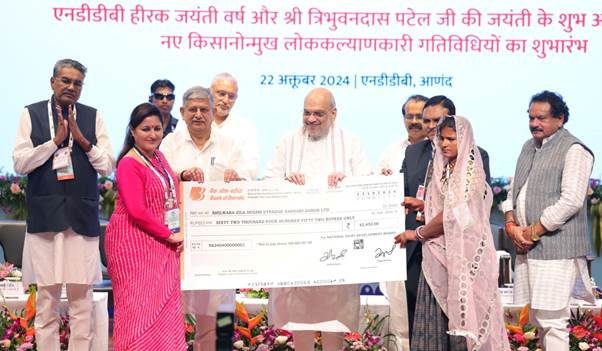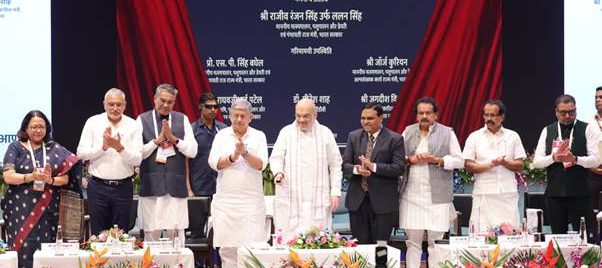Union Home Minister and Minister of Cooperation, Amit Shah, inaugurated several farmer welfare schemes worth Rs 300 crore during the National Dairy Development Board’s (NDDB) diamond jubilee celebration. The event also honoured Shri Tribhuvandas Patel’s birth anniversary in Anand, Gujarat, in the presence of Union Minister Rajiv Ranjan Singh.
In his address, Shah emphasized the launch of Standard Operating Procedures (SoP) for White Revolution 2.0, under the leadership of Prime Minister Narendra Modi, aimed at empowering one lakh new and existing dairies.
He spoke about the cooperative sector’s role in expanding milk routes and benefiting dairy farmers. Tribhuvandas Patel’s life, dedicated to uplifting farmers, was highlighted, particularly his efforts in connecting millions of farmers to cooperatives, which now collectively do business worth thousands of crores.
Shah recounted how former Prime Minister Shri Lal Bahadur Shastri, inspired by the success of Amul Dairy, laid the foundation of NDDB in 1964, to benefit livestock owners nationwide. Over the past 60 years, NDDB has played a pivotal role in empowering farmers and raising awareness about their rights. Cooperative-led animal husbandry has addressed malnutrition, empowered women, and contributed to raising strong, healthy citizens.
NDDB’s contribution to rural and agricultural development was underscored, as was its role in making agriculture self-reliant. NDDB, founded by Tribhuvandas Patel, has grown into a globally recognized institution, with its Operation Flood program from 1970 to 1996 triggering the White Revolution.
Amul’s current Rs 60,000 crore business was built on shared capital from women, and NDDB now processes 427 lakh liters of milk daily, with procurement at 589 lakh liters, a testament to its remarkable growth.
In addition to its dairy operations, NDDB has begun processing vegetables under the cooperative model, ensuring profits are distributed down to the grassroots. Shah highlighted the Gobardhan scheme, which converts cow dung into gas and fertilizer, bringing prosperity and cleaner environments to farmers.

Shah also announced that all new dairy plants will be constructed under the Make in India program. He inaugurated a Rs 210 crore Mother Dairy fruit and vegetable processing unit and launched two new ghee brands—Badri Ghee from Uttarakhand and Gir Ghee from Gujarat—signalling the cooperative sector’s ability to compete with corporate products.
He pointed out that Amul has achieved global success, and the new initiatives will support apricot farmers from Ladakh, apple growers in Himachal, and pineapple producers in Meghalaya.
India’s milk production has soared, surpassing the USA, reaching 231 million tons with a growth rate of 6%, far exceeding the global rate of 2%. However, Shah stressed that 6.5 crore families involved in milk production remain outside the cooperative sector, a gap the government seeks to close to ensure fair prices for all.
As part of the cooperative campaign, India’s per capita milk availability rose from 40 kilograms in 1970 to 167 kilograms in 2023, compared to the global average of 117 kilograms.
